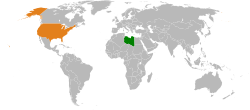Libya–United States relations
 |
|
|
Libya |
United States |
|---|---|
Libya–United States relations are today cordial and cooperative, with particularly strong security cooperation only after the 2012 attack on the US liaison office or mission in Benghazi. Furthermore, a Gallup poll conducted in March and April 2012 found that Libyans had "among the highest approval" of US leadership in the entire Middle East and North Africa region.
However, for decades prior to the 2011 Libyan Civil War, the countries were not on good terms and engaged each other in several military skirmishes. The Libyan government of Muammar Gaddafi funded terror operations against the United States, most notably the 1986 Berlin discotheque bombing, to which the United States retaliated by bombing Libya, and the 1988 Lockerbie bombing.
When the Libyan civil war broke out in 2011, the United States took part in a military intervention in the conflict, aiding anti-Gaddafi rebels with air strikes against the Libyan Army. With the success of the revolution and the overthrow of Gaddafi, US President Barack Obama said that the United States was "committed to the Libyan people" and promised partnership in the development of a new Libyan state.
According to a 2012 poll conducted by Gallup, 54% of Libyans approve of U.S. leadership, compared to only 22% and 19% respective approval for China and Russia's, and 75% of Libyans say they approved of NATO's military intervention in the civil war.
The U.S. began bombing Libya again on August 1, 2016 with permission from the GNA, as part of the military intervention against ISIL.
...
Wikipedia
